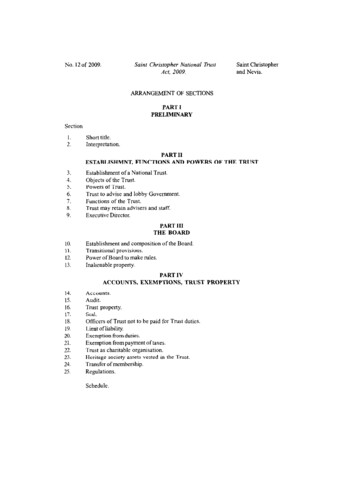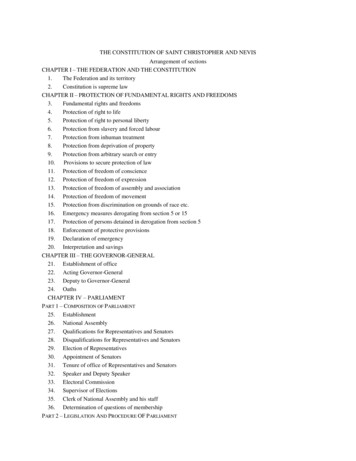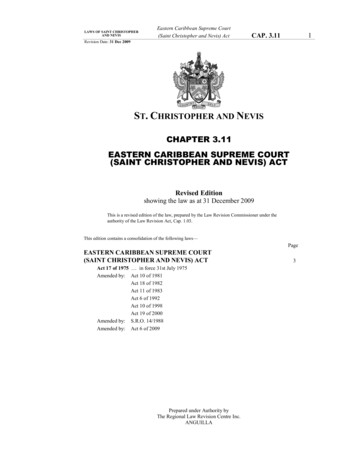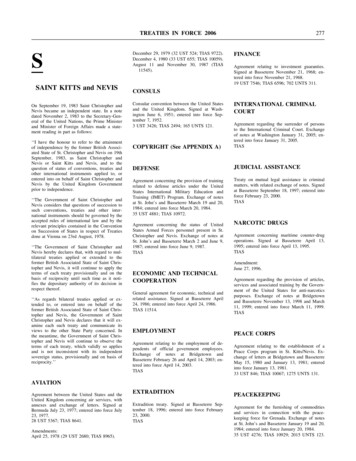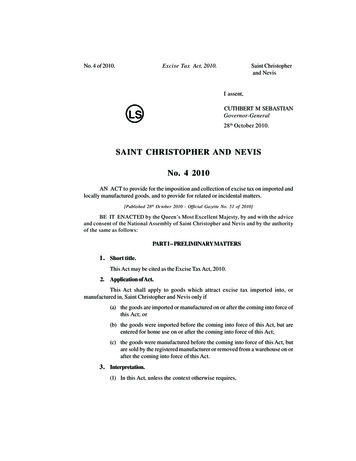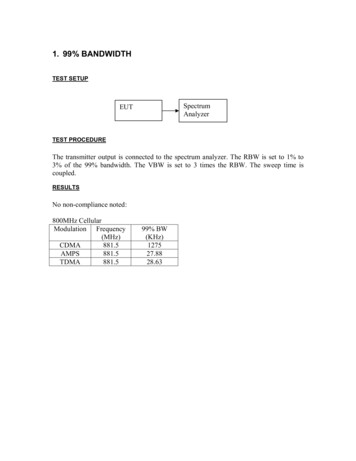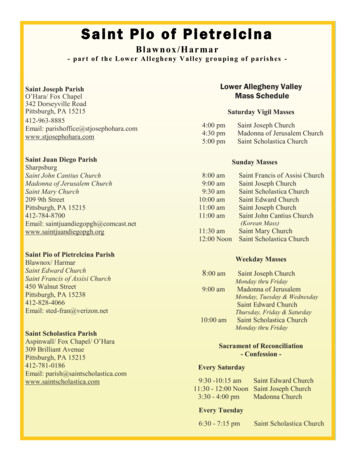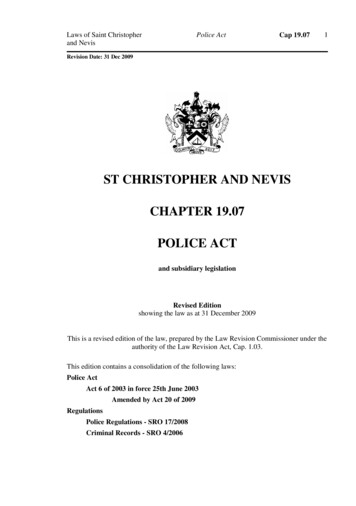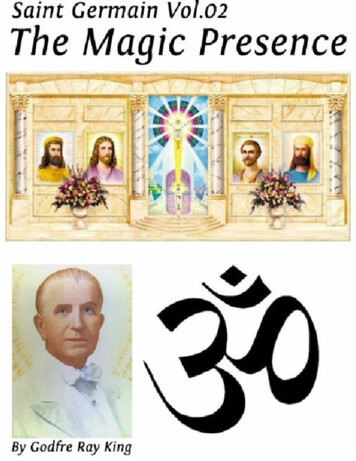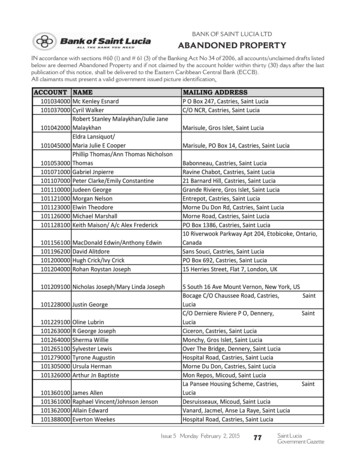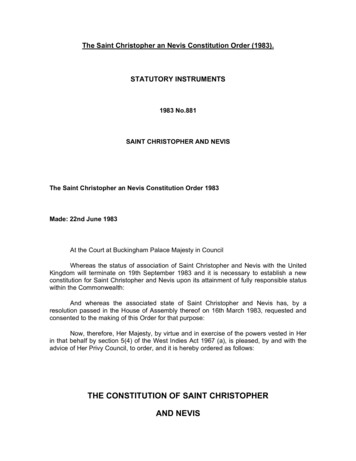
Transcription
The Saint Christopher an Nevis Constitution Order (1983).STATUTORY INSTRUMENTS1983 No.881SAINT CHRISTOPHER AND NEVISThe Saint Christopher an Nevis Constitution Order 1983Made: 22nd June 1983At the Court at Buckingham Palace Majesty in CouncilWhereas the status of association of Saint Christopher and Nevis with the UnitedKingdom will terminate on 19th September 1983 and it is necessary to establish a newconstitution for Saint Christopher and Nevis upon its attainment of fully responsible statuswithin the Commonwealth:And whereas the associated state of Saint Christopher and Nevis has, by aresolution passed in the House of Assembly thereof on 16th March 1983, requested andconsented to the making of this Order for that purpose:Now, therefore, Her Majesty, by virtue and in exercise of the powers vested in Herin that behalf by section 5(4) of the West Indies Act 1967 (a), is pleased, by and with theadvice of Her Privy Council, to order, and it is hereby ordered as follows:THE CONSTITUTION OF SAINT CHRISTOPHERAND NEVIS
WHEREAS the People of Saint Christopher and Nevisa) declare that the nation is established on the belief in Almighty God and theinherent dignity of each individual;b) assert that they are entitled to the protection of fundamental rights andfreedoms;c) believe in the concept of true democracy with free and fair elections;d) desire the creation of a climate of economic wellbeing in the context of respectfor law and order; ande) are committed to achieve their national objectives with a unity of purpose:NOW THEREFORE, the following provisions shall have effect as the Constitutionof Saint Christopher and Nevis:-CHAPTER ITHE FEDERATION AND THE CONSTITUTIONThe Federation and its territory.1.- (1) The island of Saint Christopher (which is otherwise known as Saint Kitts) and theisland of Nevis shall be a sovereign democratic federal state which may be styled SaintChristopher and Nevis or Saint Kitts and Nevis or the Federation of Saint Christopher andNevis or the Federation of Saint Kitts and Nevis.(2) The territory of Saint Christopher and Nevis shall comprise all areas that werecomprise in the associated state of Saint Christopher and Nevis immediately before 19thSeptember 1983, together with such other areas as may be declared by Parliament toform part of the territory of Saint Christopher and Nevis.Constitution is supreme law.
2.- This Constitution is the supreme law of Saint Christopher and Nevis and, subject to theprovisions of this Constitution, if any other law is inconsistent with this Constitution shallprevail and the other law shall, to the extent of the inconsistency, be void.CHAPTER IIPROTECTION OF FUNDAMENTAL RIGHTS AND FREEDOMSFundamental rights and freedoms.3.- Whereas every person in Saint Christopher and Nevis is entitled to the fundamentalrights and freedoms, that is to shay, the right, whatever his race, place of origin, birth,political opinions, colors, creed or sex, but subject to respect for the rights and freedoms ofothers and for the public interest, to each and all of the following, namelya) life, liberty, security of the person, equality before the law and the protection ofthe law;b) freedom of conscience, of expression and of assembly and association; andc) protection for his personal privacy, the privacy of his home and other propertyand from deprivation of property without compensation, the provisions of this Chapter shallhave effect for the purpose of affording protection to those rights and freedoms subject tosuch limitations of that protection as ate contained in those provisions, being limitationsdesigned to ensure that the enjoyment of those rights and freedoms by any person doesnot impair the rights and freedoms of others or the public interest.Protection of right to life.4.- (1) A person shall not be deprived of his life intentionally safe in execution of thesentence of a court in respect of a criminal offence of treason or murder under any law ofwhich he has been convicted.(2) A person shall not be regarded as having been deprived of his life incontravention of subsection (1) if he dies as the result of the use, to such extent and insuch circumstances as are permitted by law, of such force as is reasonably justifiablea) for the defence of any person from violence or for the defence of property;
b) in order to effect a lawful arrest, or to prevent the escape, or a person lawfullydetained;c) for the purpose of suppressing a riot, insurrection or mutiny; ord) in order to prevent the commission by that person of a criminal offence,or if he dies as the result of a lawful act of war.Protection of right to personal liberty.5.- (1) A person shall not be deprived of his personal liberty save as may be authorized bylaw in any of the following cases, that is to saya) in consequence of his unfitness to plead to a criminal charge;b) in execution of the sentence or order of a court, whether established for SaintChristopher and Nevis or some other country, in respect of a criminal offence of which hehas been convicted;c) in execution of the order of the High Court or the Court of Appeal punishing himfor contempt of that court or of another court or tribunal;d) in execution of the order of a court made to secure the fulfillment of anyobligation imposed on him by law;e) for the purpose of bringing him before a court in execution of the order of a court;f) upon reasonable suspicion of his having committed, or being about to commit, acriminal offence under any law;g) under the order of a court or with the consent of his parent or guardian, for hiseducation or welfare during any a period ending not later than the date when he attains theage of eighteen years;h) for the purpose of preventing the spread of an infectious of contagious disease;i) in the case of a person who is, or is reasonably suspected to be, of unsoundmound, addicted to drugs or alcohol, or a vagrant, for the purpose of his case or treatmentor the protection of the community;j) for the purpose of preventing the unlawful entry of that person into SaintChristopher and Nevis or for the purpose of effecting the expulsion, extradition or otherlawful removal of that person from Saint Christopher and Nevis or for the purpose ofrestricting that person while he is being conveyed through Saint Christopher and Nevis in
the course of his extradition or removal as a convicted prisoner from one country toanother; ork) to such extent as may be necessary in the execution of a lawful order requiringthat person to remain within a specified area within Saint Christopher and Nevis, orprohibiting him from being within such an area, or to such extent as may be reasonablyjustifiable for the taking of proceedings against that person with a view to the making ofany such order or relating to such an order after it has been made, or to such extent asmay be reasonably justifiable for restraining that person during any visit that he ispermitted to make to any part of Saint Christopher and Nevis in which, in consequence ofany such order, his presence would otherwise be unlawful.(2) Any person who is arrested or detained shall with reasonable promptitude andin any case not later than forty-eight hours after such arrest or detention be informed in alanguage that he understands of the reasons for his arrest or detention and be affordedreasonable facilities for private communication and consultation with a legal practitioner ofhis own choice and, in the case of a person under the age of eighteen years, with hisparents or guardian.(3) Any person who is arrested or detaineda) for the purpose of bringing him before a court in execution of the order of a court;orb) upon reasonable suspicion of his having committed, or being about to commit, acriminal offence under any law and who is not released, shall be brought before a courtwithout undue delay and in any case not later than seventy-two hours after his arrest ordetention.(4) Where any person is brought before a court in execution of the order of a courtin any proceedings or upon suspicion of his having committed or being about to commit acriminal offence, he shall not be thereafter further held in custody in connection with thoseproceedings of that offence save upon the order of a court.(5) If any person arrested or detained as mentioned in subsection (3)(b) is not triedwithin a reasonable time, then, without prejudice to any further proceedings that may bebrought against him, he shall be released either unconditionally or upon reasonableconditions, including in particular such conditions as are reasonably necessary to ensurethat he appears at a later date for trial or for proceedings preliminary to trial, and suchconditions may include bail so long as it is not excessive.(6) Any person who is unlawfully arrested or detained by any other person shall beentitled to compensation thereof from that other person or from any other person orauthority on whose behalf that other person was acting:Provided that a judge, a magistrate or a justice of the peace or an officer of a curtof a police officer acting in pursuance of the order of a judge, a magistrate or a justice ofthe peace shall not be under any personal liability to pay compensation under thissubsection in consequence of any act performed by him in good faith in the discharge of
the functions of his office and any liability to pay any such compensation in consequenceof any such act shall be a liability of the Crown.(7) For the purposes of subsection (1)(b) a person charged before a court with acriminal offence in respect of whom a special verdict has been returned that he was guiltyof the act or omission or that he is not guilty by reason of insanity shall be regarded as aperson who has been convected of a criminal offence and the detention of that person inconsequence of such a verdict shall be regarded as detention in execution of the order ofa court.Protection from slavery of forced labour.6.- (1) A person shall not be held in slavery or servitude.(2) No person shall be required to perform forced labour.(3) For the purposes of this section, the expression "forced labour" does notincludea) any labour required in consequence of the sentence or order of a court;b) labour required of any person while he is lawfully detained that, though notrequired in consequence of the sentence or order of a court, is reasonably necessary inthe interests of hygiene or for the maintenance of the place at which he is detained;c) any labour required of a member of a disciplined force in pursuance of his dutiesas such or, in the case of a person who has conscientious objections to service as amember of a defence force, any labour that person is required by law to perform in placeof such service; ord) any labour required during any period of public emergency or in the event of anyaccident or natural calamity that threatens the life and well-being of the community, to heextent that the requiring of such labour is reasonably justifiable in the circumstances of anysituation arising or existing during that period or as a result of that accident or naturalcalamity, for the purpose of dealing with that situation.Protection from inhuman treatment.7.- A person shall not be subjected to torture or to inhuman or degrading punishment orother like treatment.
Protection from deprivation of property.8.- (1) No property of any description shall be compulsorily taken possession of, and nointerest in or right over property of any description shall be compulsorily acquired, exceptfor a public purpose and by or under the provisions of a law that prescribes the principleson which and the manner in which compensation therefor is to be determined and given.(2) Every person having an interest in or right over property that is compulsorilytaken possession of or whose interest in or right over any property is compulsorilyacquired shall have a right of direct access to the High Court fora) the determination of his interest or right, the legality of the taking of possessionor acquisition of the property, interest of right and the amount of any compensation towhich he is entitled; andb) the purpose of enforcing his right to prompt payment of that compensation:Provided that, if the legislature so provides in relation to any matter referred to inparagraph (a), the right of access shall be by way of a appeal (exercisable as of right atthe instance of the person having the interest in or right over the property) from a tribunalor authority, other than the High Court, having jurisdiction under any law to determine thatmatter.(3) The Chief Justice may make rules with respect to the practice and procedure ofthe High Court or, subject to such provisions as may have been made in that behalf by thelegislature, with respect to the practice and procedure of any other tribunal or authority inrelation to the jurisdiction conferred on the High Court by subsection (2) or exercisable bythe other tribunal or authority for the purposes of that subsection (including rules withrespect to the time within which applications or appeals to the High Court or applications tothe other tribunal or authority may be brought).(4) A person who is untitled to compensation by virtue of subsections (1) shall notbe prevented from remitting, within a reasonable time after he has received any amount ofthat compensation in the form of a sum of money or, as the case may be, has receivedany such amount in some other form and has converted any of that amount into a such ofmoney, the whole of that some of money (subject to any tax that applies generally topersons remitting moneys but free from any other deduction, charge of tax made or leviedin respect of its remission) to any country of his choice outside Saint Christopher andNevis.(5) Nothing contained in or done under the authority of any law shall be held to beinconsistent with or in contravention of subsection (4) to the extent that the law in questionauthorizes-
a) the attachment, by order of a court, of any amount of compensation to which aperson is entitled in satisfaction of the judgment of a court or pending the determination ofcivil proceedings to which he is a party;b) the imposition of reasonable restrictions on the manner in which any sum ofmoney is to be remitted; orc) the imposition of reasonable restrictions upon the remission of any sum ofmoney in order to prevent or regulate the transfer to a country outside Saint Christopherand Nevis of capital raised in Saint Christopher and Nevis or in some other country orderived from the natural resources of Saint Christopher and Nevis.(6) Nothing contained in or done under the authority of any law shall be held to beinconsistent with or in contravention of subsection (1)a) to the extent that law in question makes provision for the taking of possession ofor acquisition of any property, interest or righti) in satisfaction of any tax, rate or due,ii) by way of penalty for breach of any law or forfeiture in consequence ofbreach of any law;iii) as an incident of a lease, tenancy, mortgage, charge, bill of sale, pledgeor contract;iv) in the execution of judgments or orders of a court in proceedings for thedetermination of civil rights or obligations;v) in circumstances where it is reasonably necessary so to do because theproperty is in a dangerous state or likely to be injurious to the health of humanbeings, animals or plants;vi) in consequence of any law with respect to the limitation of actions; orvii) for so long only as may be necessary for those purposes, for thepurposes of any examination, investigation, trial or inquiry or, in the case of land,for the purposes of the carrying out thereon of work of soil conservation or theconservation of other natural resources or work relating to agricultural developmentor improvement (being work relating to such development or improvement that theowner or occupier of the land has been required, and has without reasonableexcuse refused or failed, to carry out), and except so far as that provision or, as thecase may be, the thing done under he authority thereof is shown not to bereasonably justifiable in a democratic society; orb) to the extent that the law in question makes provision for the taking ofpossession of or acquisition of any of the following property (including an interest in or rightover property), that is to sayi) enemy property;
ii) property of a deceased person, a person of unsound mind or a personwho has not attained the age of eighteen years, for the purpose of itsadministration for the benefit of the persons entitled to the beneficial interesttherein;iii) property of a person adjudged bankrupt or a body corporate inliquidation, for the purpose of its administration for the benefit of the creditors of thebankrupt or body corporate and, subject thereto, for the benefit of other personsentitled to the beneficial interest in the property; oriv) property subject to a trust, for the purpose of vesting the property inpersons appointed as trustees under the instrument creating the trust or by a courtor, by order of a court, for the purpose of giving effect to the trust.(7) Nothing contained in or done under the authority of any law enacted byParliament shall be held to be inconsistent with or in contravention of this section to theextent that the law in question makes provision for the compulsory acquisition of anyinterest in or right over property, where that property, interest or right is held by a bodycorporate established by law for public purposes in which no moneys have been investedother than money provided by Parliament.(8) Nothing contained in or done under the authority of any law enacted by theNevis Island Legislature shall be held to be inconsistent with or in contravention of thissection to the extent that the law in question makes provisions for the compulsory taking ofpossession of any property, or the compulsory acquisition of any interest in or right overproperty, where that property, interest or right is held by a body corporate established bylaw for public purposes in which no moneys have been invested other than moneysprovided by that Legislature.Protection from arbitrary search or entry.9.- (1) Except with his own consent, a person shall not be subject to the search of hisperson or his property or the entry by others o his premises.(2) Nothing contained in or done under he authority of any law shall be held to beinconsistent with or in contravention of this section to the extent that the law in questionmakes provisiona) that is reasonably required in the interests of defence, public safety, public order,public morality, public health, town and country planning, the development and utilizationof mineral resources or the development or utilization of any property for a purposebeneficial to the community;b) that is reasonably requires for the purpose of protecting the rights or freedoms ofother persons;
c) that authorizes an officer or agent of the Government, the Nevis IslandAdministration, a local government authority or a body corporate established by law forpublic purposes to enter on the premises of any person in order to inspect those premisesor any thing thereon for the purposes of any tax, rate or due or in order to carry out workconnected with any property that is lawfully on those premises and that belongs to thatGovernment, Administration, authority or body corporate, as the case may be; ord) that authorizes, for the purpose of enforcing the judgment or order of a court inany civil proceedings, the search of any person or property by order of a court or entryupon any premises by such an order, and except so far as that provision or, as the casemay be, anything done under the authority thereof is shown not to be reasonably justifiablein a democratic society.Provisions to secure protection of law.10.- (1) If any person is charged with a criminal offence, then unless the charge iswithdrawn, the case shall be afforded a fair hearing within a reasonable time by anindependent and impartial court established by law.(2) Every person who is charged with a criminal offencea) shall be presumed to be innocent until he is proved or has pleaded guilty;b) shall be informed as soon as reasonably practicable, in a language that heunderstands and in detail, of the nature of the offence charged;c) shall be given adequate time and facilities for the preparation of his defence;d) shall be permitted to defend himself before the court in person or, at his ownexpense, by a legal practitioner of his own choice;e) shall be afforded facilities to examine in person or by his legal representative thewitnesses called by the prosecution before the court, and to obtain the attendance andcarry out the examination of witnesses to testify on his behalf before the court on the sameconditions as those applying to witnesses called by the prosecution; andf) shall be permitted to have without payment the assistance of an interpreter if hecannot understand the language used at the trial, and except with his own consent the trialshall not take place in his presence impracticable and the court has ordered him to beremoved and the trial to proceed in his absence:Provided that the trial may take place in his absence in any case in which it is soprovided by a law under which he is entitled to adequate notice of the charge and the date,time and place of the trial and to a reasonable opportunity of appearing before the court.
(3) When a person is tried for any criminal offence, the accused person or anyperson authorized by him in that behalf shall, if he so requires and subject to payment ofsuch reasonable fee as may be prescribed by law, be given within a reasonable time afterjudgment a copy for the use of the accused person of any record of the proceedings madeby or on behalf of the court.(4) A person shall not be held to be guilty of a criminal offence on account of anyact or omission that did not, at the time it took place,constitute such an offence, and nopenalty shall be imposed for any criminal offence that is severer in degree or descriptionthan the maximum penalty that might have been imposed for that offence at the time whenit was committed.(5) A person who shows that he has been tried by a competent court for a criminaloffence and either convicted or acquitted shall not again be tried for that offence or for anyother criminal offence, save upon the order of a superior court in the course of appeal orreview proceedings relating to the conviction or acquittal.(6) A person shall not be tried for a criminal offence if he shows that he has beenpardoned for that offence.(7) A person who is tried for a criminal offence shall not be compelled to giveevidence at the trial.(8) Any court or other authority prescribed by a law for the determination of theexistence or extent of any civil right or obligation shall be established by law and shall beindependent and impartial; and where proceedings for such a determination are institutedby any person before such a court or other authority, the case shall be given a fair hearingwithin a reasonable time.(9) Where the existence or extent of any civil right or obligation has beendetermined in proceedings in any court or before any other authority any party to thoseproceedings shall, if he so requires and subject to payment of such reasonable fee as maybe prescribed by law, be entitled to obtain within a reasonable time after the judgment orother determination a copy of any record of the proceedings made by or on behalf of thecourt of other authority.(10) Except with the agreement of all the parties thereto, all proceedings of everycourt and all proceedings for the determination of the existence or extent of any civil rightor obligation before any other authority, including the announcement of the decision of thecourt or other authority, shall be held in public.(11) Nothing in subsection (10) shall prevent the court or other adjudicatingauthority from excluding from the proceedings persons other than the parties thereto andthe legal practitioners representing them to such extent as the court or other authoritya) may by law be empowered to do and may consider necessary or expedient incircumstances where publicity would impair the interests of justice or in interlocutoryproceedings or in the interests of public morality, the welfare of persons under the age ofeighteen years of the protection of the private lives of persons concerned in theproceedings; or
b) may by a law be empowered or required to do in the interests of defence, publicsafety or public order.(12) Nothing contained in or done under the authority of any law shall be held to beinconsistent with or in contravention ofa) subsection (2)(a) to the extent that the law in question imposes upon any personcharged with a criminal offence the burden of proving particular facts;b) subsection (2)(e) to the extent that the law in question imposes reasonableconditions that mist be satisfied if witnesses called to testify on behalf of an accusedperson are to be paid their expenses out of public funds; orc) subsection (5) to the extent that the law in question authorizes a court to try amember of a disciplined force for a criminal offence notwithstanding any trial andconviction or acquittal of that member under the disciplinary law of that force, so, however,that any court so trying such a member and convicting him shall in sentencing him to anypunishment take into account any punishment awarded him under that disciplinary law.(13) In the case of any person who is held in lawful detention subsection (1),paragraphs (d) and (e) of subsection (2) and subsection (3) shall not apply in relation to histrial for a criminal offence under the law regulating the discipline of persons held in suchdetention.(14) In this section "criminal offence"means a criminal offence under a law.Protection of freedom of conscience.11.- (1) Except with his own consent, a person shall not be hindered in the enjoyment ofhis freedom of conscience, including freedom of thought and of religion, freedom tochange his religion or belief and freedom, either alone or in community with others, andboth in public and in private, to manifest and propagate his religion or belief in worship,teaching, practice and observance.(2) Except with his own consent (or, if he is a person under the age of eighteenyears, the consent of a person who is his parent or guardian) a person attending any placeof education, detained in any prison or corrective institution or serving in a defence forceshall not be required to receive religious instruction or to take part in or attend any religiousceremony or observance if that instruction, ceremony or observance relates to a religionthat is not his own.(3) Every religious community shall be entitled, at its own expense, to establish andmaintain places of education and to manage any place of education that it whollymaintains and such a community shall not be prevented from providing religious instructionfor persons of that community in the course of any education that it wholly maintains or inthe course of any education that it otherwise provides.
(4) A person shall not be compelled to take any oath that is contrary to his religionor belief or to take any oath in a manner that is contrary to his religion or belief.(5) Nothing contained in or done under the authority of any law shall be held to beinconsistent with or in contravention of this section to the extent that the law in questionmakes provisions that is reasonably requireda) in the interests of defence, public safety, public order, public morality or publichealth;b) for the purpose of protecting the rights and freedoms of other persons, includingthe right to observe and practice any religion without the unsolicited intervention ofmembers of any other religion; orc) for the purpose or regulating educational institutions in the interests of thepersons who receive or may receive instruction in them, and except so far as thatprovisions or, as the case may be, the thing done under the authority thereof is shown notto be reasonably justifiable in a democratic society.(6) References in this section to a religion shall be construed as includingreferences to a religious denomination, and cognate expression shall be construedaccordingly.Protection of freedom of expression.12.- (1) Except with his own consent, a person shall not be hindered in the enjoyment ofhis freedom of expression, including freedom to hold opinions without interference,freedom to receive ideas and information without interference, freedom to communicateideas and information without interference (whether the communication is to the publicgenerally or to any person or class of persons) and freedom from interference with hiscorrespondence.(2) Nothing contained in or done under the authority of any law shall be held to beinconsistent with or in contravention of this section to the extent that the law in questionmakes provisiona) that is reasonably required in the interests of defence, public safety, public order,public morality or public health;b) that is reasonably required for the purpose of protecting the reputations, rightsand freedoms of other persons of the private lives of persons concerned in legalproceedings, preventing the disclosure of information received in confidence, maintainingthe authority and independence of the courts or regulating telephony, telegraphy, posts,wireless broadcasting or television; or
c) that imposes restrictions upon public officers that are reasonably required for theproper performance of their functions,and except so far as that provisions or, as the case may be, the things done under theauthority thereof is shown not to be reasonably justifiable in a democratic society.Protection of freedom of assembly and association.13.- (1) Except with his own consent, a person shall not be hindered in the enjoyment ofhis freedom of assembly and associati
The Saint Christopher an Nevis Constitution Order 1983 Made: 22nd June 1983 At the Court at Buckingham Palace Majesty in Council Whereas the status of association of Saint Christopher and Nevis with the United Kingdom will terminate on 19th September 1983 and it is necessary to establish a new
